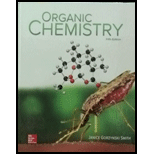
Concept explainers
(a)
Interpretation: The explanation corresponding to the incorrect IUPAC name
Concept introduction: The systematic naming of organic compound is given by
Rules for writing structural formula from IUPAC are:
1. First identify the word root for the given compound.
2. The suffix used in the compound like –ene.
3. Identify the position, location, and number of the substituent bonded to the carbon chain.
Answer to Problem 4.41P
The naming of substituents attached to the longest carbon chain is not in alphabetical order. The correct IUPAC name is
Explanation of Solution
The given IUPAC name is
The structure corresponding to the given IUPAC name is shown below.
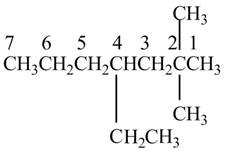
Figure 1
Rules for writing IUPAC name from structural formula are:
1. First identify the longest carbon chain.
2. The next step is to identify the groups attached to the longest chain.
3. Identify the position, location, and number of the substituent bonded to the carbon chain.
4. Use prefix di, tri, tetra if same type of substituent is present.
5. Name the substituents in alphabetical order.
The given name is
The naming of substituents attached to the longest carbon chain is not in alphabetical order. The correct IUPAC name is
(b)
Interpretation: The explanation corresponding to the incorrect IUPAC name
Concept introduction: The systematic naming of organic compound is given by IUPAC nomenclature. The naming of organic compound is done such that the structure of organic compound is correctly interpreted from the name.
Rules for writing structural formula from IUPAC are:
1. First identify the word root for the given compound.
2. The suffix used in the compound like –ene.
3. Identify the position, location, and number of the substituent bonded to the carbon chain.
Answer to Problem 4.41P
The longest carbon chain in the given IUPAC name contains seven carbon atoms instead of six carbon atoms. The correct IUPAC name is
Explanation of Solution
The given IUPAC name is
The structure corresponding to the given IUPAC name is shown below.
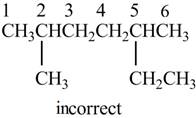
Figure 2
According to the given IUPAC name, the structure contains six carbon atoms.
Rules for writing IUPAC name from structural formula are:
1. First identify the longest carbon chain.
2. The next step is to identify the groups attached to the longest chain.
3. Identify the position, location, and number of the substituent bonded to the carbon chain.
4. Use prefix di, tri, tetra if same type of substituent is present.
5. Name the substituents in alphabetical order.
Thus, the correct structure for the given name is shown below.
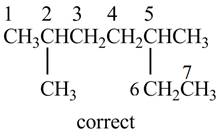
Figure 3
The longest carbon chain in the given IUPAC name contains seven carbon atoms instead of six carbon atoms. Thus, the correct IUPAC name is
The longest carbon chain in the given IUPAC name contains seven carbon atoms instead of six carbon atoms., the correct IUPAC name is
(c)
Interpretation: The explanation corresponding to the given incorrect IUPAC name
Concept introduction: The systematic naming of organic compound is given by IUPAC nomenclature. The naming of organic compound is done such that the structure of organic compound is correctly interpreted from the name.
Rules for writing structural formula from IUPAC are:
1. First identify the word root for the given compound.
2. The suffix used in the compound like –ene.
3. Identify the position, location, and number of the substituent bonded to the carbon chain.
Answer to Problem 4.41P
The longest carbon chain in the given IUPAC name contains eight carbon atoms instead of seven carbon atoms. The correct IUPAC name is
Explanation of Solution
The given IUPAC name is
The structure corresponding to the given IUPAC name is shown below.
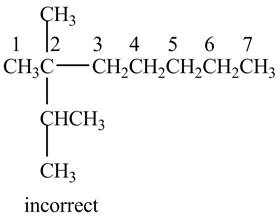
Figure 4
According to the given IUPAC name, the structure contains seven carbon atoms.
Rules for writing IUPAC name from structural formula are:
1. First identify the longest carbon chain.
2. The next step is to identify the groups attached to the longest chain.
3. Identify the position, location, and number of the substituent bonded to the carbon chain.
4. Use prefix di, tri, tetra if same type of substituent is present.
5. Name the substituents in alphabetical order.
Thus, the correct structure for the given name is shown below.
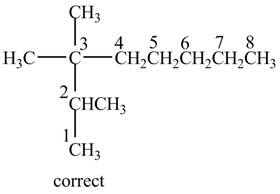
Figure 5
The longest carbon chain in the given IUPAC name contains eight carbon atoms instead of seven carbon atoms. Therefore, the correct IUPAC name is
The longest carbon chain in the given IUPAC name contains eight carbon atoms instead of seven carbon atoms. The correct IUPAC name is
(d)
Interpretation: The explanation corresponding to the given incorrect IUPAC name
Concept introduction: The systematic naming of organic compound is given by IUPAC nomenclature. The naming of organic compound is done such that the structure of organic compound is correctly interpreted from the name.
Rules for writing structural formula from IUPAC are:
1. First identify the word root for the given compound.
2. The suffix used in the compound like –ene.
3. Identify the position, location, and number of the substituent bonded to the carbon chain.
Answer to Problem 4.41P
The structure corresponding to the given name is incorrect because the numbering of substituents is wrong. The correct IUPAC name is
Explanation of Solution
The given IUPAC name is
The structure corresponding to the given IUPAC name is shown below.
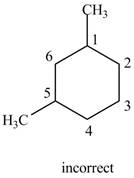
Figure 6
Rules for writing IUPAC name from structural formula are:
1. First identify the longest carbon chain.
2. The next step is to identify the groups attached to the longest chain.
3. Identify the position, location, and number of the substituent bonded to the carbon chain.
4. Use prefix di, tri, tetra if same type of substituent is present.
5. Name the substituents in alphabetical order.
The given name is
The structure corresponding to the given name is incorrect because higher number is assigned to the second methyl substituent.
Therefore, the correct structure is shown below.
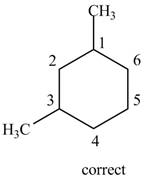
Figure 7
Thus, the correct IUPAC name is
The structure corresponding to the given name is incorrect because higher number is assigned to the second substituent. The correct IUPAC name is
(e)
Interpretation: The explanation corresponding to the incorrect IUPAC name
Concept introduction: The systematic naming of organic compound is given by IUPAC nomenclature. The naming of organic compound is done such that the structure of organic compound is correctly interpreted from the name.
Rules for writing structural formula from IUPAC are:
1. First identify the word root for the given compound.
2. The suffix used in the compound like –ene.
3. Identify the position, location, and number of the substituent bonded to the carbon chain.
Answer to Problem 4.41P
The structure corresponding to the given name is incorrect because higher number is assigned to the second substituent. The correct IUPAC name is
Explanation of Solution
The given IUPAC name is
The structure corresponding to the given IUPAC name is shown below.
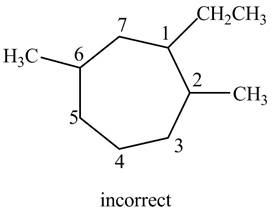
Figure 8
Rules for writing IUPAC name from structural formula are:
1. First identify the longest carbon chain.
2. The next step is to identify the groups attached to the longest chain.
3. Identify the position, location, and number of the substituent bonded to the carbon chain.
4. Use prefix di, tri, tetra if same type of substituent is present.
5. Name the substituents in alphabetical order.
The given name is
The structure corresponding to the given name is incorrect because higher number is assigned to the second substituent.
Therefore, the correct structure is shown below.
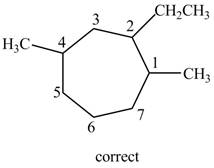
Figure 9
Thus, the correct IUPAC name is
The structure corresponding to the given name is incorrect because higher number is assigned to the second substituent. The correct IUPAC name is
(f)
Interpretation: The explanation corresponding to the incorrect IUPAC name
Concept introduction: The systematic naming of organic compound is given by IUPAC nomenclature. The naming of organic compound is done such that the structure of organic compound is correctly interpreted from the name.
Rules for writing structural formula from IUPAC are:
1. First identify the word root for the given compound.
2. The suffix used in the compound like –ene.
3. Identify the position, location, and number of the substituent bonded to the carbon chain.
Answer to Problem 4.41P
The structure corresponding to the given name is incorrect because the numbering of substituents is wrong. The correct IUPAC name is
Explanation of Solution
The given IUPAC name is
The structure corresponding to the given IUPAC name is shown below.
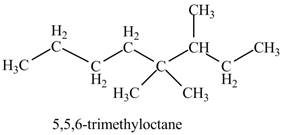
Figure 10
Rules for writing IUPAC name from structural formula are:
1. First identify the longest carbon chain.
2. The next step is to identify the groups attached to the longest chain.
3. Identify the position, location, and number of the substituent bonded to the carbon chain.
4. Use prefix di, tri, tetra if same type of substituent is present.
5. Name the substituents in alphabetical order.
The given name is
The structure corresponding to the given name is incorrect because substituents should get lowest locant number.
Therefore, the correct structure is shown below.
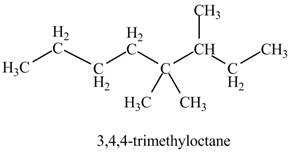
Figure 11
Thus, the correct IUPAC name is
The structure corresponding to the given name is incorrect because higher number is assigned to the second substituent. The correct IUPAC name is
(g)
Interpretation: The explanation corresponding to the incorrect IUPAC name
Concept introduction: The systematic naming of organic compound is given by IUPAC nomenclature. The naming of organic compound is done such that the structure of organic compound is correctly interpreted from the name.
Rules for writing structural formula from IUPAC are:
1. First identify the word root for the given compound.
2. The suffix used in the compound like –ene.
3. Identify the position, location, and number of the substituent bonded to the carbon chain.
Answer to Problem 4.41P
The structure corresponding to the given name is incorrect because the numbering of substituents is wrong. The correct IUPAC name is
Explanation of Solution
The given IUPAC name is
The structure corresponding to the given IUPAC name is shown below.
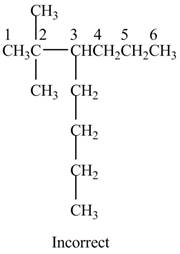
Figure 12
Rules for writing IUPAC name from structural formula are:
1. First identify the longest carbon chain.
2. The next step is to identify the groups attached to the longest chain.
3. Identify the position, location, and number of the substituent bonded to the carbon chain.
4. Use prefix di, tri, tetra if same type of substituent is present.
5. Name the substituents in alphabetical order.
The given name is
Therefore, the correct structure is shown below.
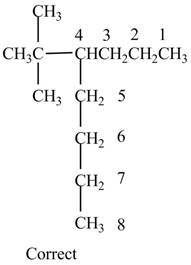
Figure 13
Thus, the correct IUPAC name is
The structure corresponding to the given name is incorrect because higher number is assigned to the second substituent. The correct IUPAC name is
(h)
Interpretation: The explanation corresponding to the incorrect IUPAC name
Concept introduction: The systematic naming of organic compound is given by IUPAC nomenclature. The naming of organic compound is done such that the structure of organic compound is correctly interpreted from the name.
Rules for writing structural formula from IUPAC are:
4. First identify the word root for the given compound.
5. The suffix used in the compound like –ene.
6. Identify the position, location, and number of the substituent bonded to the carbon chain.
Answer to Problem 4.41P
The structure corresponding to the given name is incorrect because higher number is assigned to the second substituent. The correct IUPAC name is
Explanation of Solution
The given IUPAC name is
The structure corresponding to the given IUPAC name is shown below.
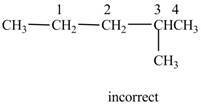
Figure 14
Rules for writing IUPAC name from structural formula are:
1. First identify the longest carbon chain.
2. The next step is to identify the groups attached to the longest chain.
3. Identify the position, location, and number of the substituent bonded to the carbon chain.
4. Use prefix di, tri, tetra if same type of substituent is present.
5. Name the substituents in alphabetical order.
The given name is
Therefore, the correct structure is shown below.
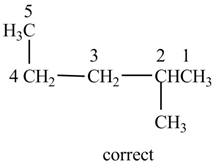
Figure 15
The longest carbon chain contains five carbon atoms instead of four carbon atoms.
Thus, the correct IUPAC name is
The structure corresponding to the given name is incorrect because higher number is assigned to the second substituent. The correct IUPAC name is
Want to see more full solutions like this?
Chapter 4 Solutions
Organic Chemistry
- Steps and explanations please.arrow_forwardSteps on how to solve. Thank you!arrow_forward3. Name this ether correctly. H₁C H3C CH3 CH3 4. Show the best way to make the ether in #3 by a Williamson Ether Synthesis. Start from an alcohol or phenol. 5. Draw the structure of an example of a sulfide.arrow_forward
- 1. Which one(s) of these can be oxidized with CrO3 ? (could be more than one) a) triphenylmethanol b) 2-pentanol c) Ethyl alcohol d) CH3 2. Write in all the product(s) of this reaction. Label them as "major" or "minor". 2-methyl-2-hexanol H2SO4, heatarrow_forward3) Determine if the pairs are constitutional isomers, enantiomers, diastereomers, or mesocompounds. (4 points)arrow_forwardIn the decomposition reaction in solution B → C, only species C absorbs UV radiation, but neither B nor the solvent absorbs. If we call At the absorbance measured at any time, A0 the absorbance at the beginning of the reaction, and A∞ the absorbance at the end of the reaction, which of the expressions is valid? We assume that Beer's law is fulfilled.arrow_forward
- > You are trying to decide if there is a single reagent you can add that will make the following synthesis possible without any other major side products: 1. ☑ CI 2. H3O+ O Draw the missing reagent X you think will make this synthesis work in the drawing area below. If there is no reagent that will make your desired product in good yield or without complications, just check the box under the drawing area and leave it blank. Click and drag to start drawing a structure. Explanation Check ? DO 18 Ar B © 2025 McGraw Hill LLC. All Rights Reserved. Terms of Use | Privacy Center | Accessibilityarrow_forwardDon't use ai to answer I will report you answerarrow_forwardConsider a solution of 0.00304 moles of 4-nitrobenzoic acid (pKa = 3.442) dissolved in 25 mL water and titrated with 0.0991 M NaOH. Calculate the pH at the equivalence pointarrow_forward
- What is the name of the following compound? SiMe3arrow_forwardK Draw the starting structure that would lead to the major product shown under the provided conditions. Drawing 1. NaNH2 2. PhCH2Br 4 57°F Sunny Q Searcharrow_forward7 Draw the starting alkyl bromide that would produce this alkyne under these conditions. F Drawing 1. NaNH2, A 2. H3O+ £ 4 Temps to rise Tomorrow Q Search H2arrow_forward
 Chemistry: An Atoms First ApproachChemistryISBN:9781305079243Author:Steven S. Zumdahl, Susan A. ZumdahlPublisher:Cengage Learning
Chemistry: An Atoms First ApproachChemistryISBN:9781305079243Author:Steven S. Zumdahl, Susan A. ZumdahlPublisher:Cengage Learning
